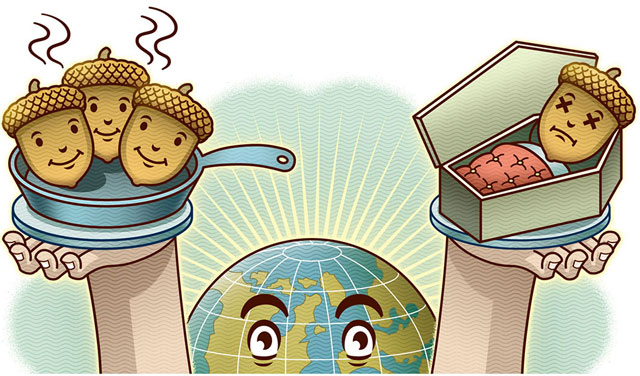sierraclub.org - sierra magazine - may/june 2013 - on the one hand . . . acorns
Canada's First Nations flex their sovereignty | Critter: Moon bear | Next Big Thing: Tricycles |
Graphic: Top 10 "least wanted" fossil fuel projects | On the One Hand: Acorns | Woe Is Us: Allergies go amok | Up to Speed
On the One Hand . . . Acorns

Illustration by Peter and Maria Hoey
ON THE ONE HAND . . .
Acorns, a diet staple of California's Native Americans for centuries, have lost their gastronomical cachet, except among bears and squirrels. But the nuts may be poised for a culinary comeback. Ethnobotanist Jolie Lonner Egert of Go Wild Consulting suggests acorns as the perfect gluten-free eco-food. "Acorns are abundant, delicious, and nutritious," she says. A 1986 study of acorns' agricultural promise found them to be packed with vitamins, minerals, and protein while requiring little cultivation. Their oil is similar to olive oil, and some of the world's 500 varieties even have notes of chocolate and cashew. "People have acorns in their yard," Egert says. "Instead of dumping them, eat them."
ON THE OTHER . . .
But will acorns even be around much longer? Around 1995, the previously unknown water mold Phytophthora ramorum—a relative of the pathogen that caused the potato famine in 19th-century Ireland—was observed infecting oak trees in Mill Valley, California. Since then, sudden oak death has spread to 14 counties in California and 1 in Oregon, killing more than a million trees. While the pathogen probably arrived via ornamental nursery plants from Asia, it now likely spreads through wind, rain, and human footsteps. Foresters fear that California could eventually lose 90 percent of its live oaks and tan oaks, keystone species that provide habitat for hundreds of varieties of native creatures.
—Dashka Slater
NEXT: Woe Is Us: Allergies go amok